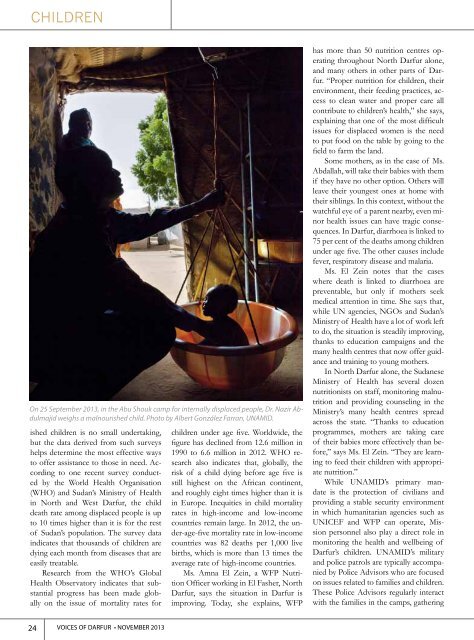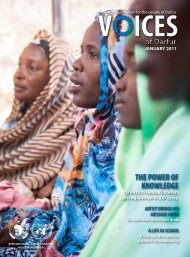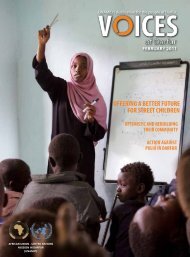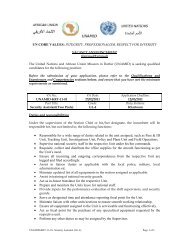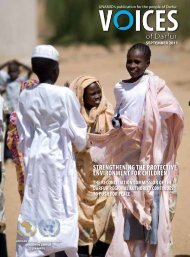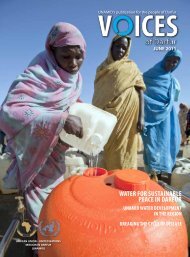Darfur Dances
Download the magazine (PDF) here. - Unamid
Download the magazine (PDF) here. - Unamid
- No tags were found...
You also want an ePaper? Increase the reach of your titles
YUMPU automatically turns print PDFs into web optimized ePapers that Google loves.
CHILDREN<br />
On 25 September 2013, in the Abu Shouk camp for internally displaced people, Dr. Nazir Abdulmajid<br />
weighs a malnourished child. Photo by Albert González Farran, UNAMID.<br />
ished children is no small undertaking,<br />
but the data derived from such surveys<br />
helps determine the most effective ways<br />
to offer assistance to those in need. According<br />
to one recent survey conducted<br />
by the World Health Organisation<br />
(WHO) and Sudan’s Ministry of Health<br />
in North and West <strong>Darfur</strong>, the child<br />
death rate among displaced people is up<br />
to 10 times higher than it is for the rest<br />
of Sudan’s population. The survey data<br />
indicates that thousands of children are<br />
dying each month from diseases that are<br />
easily treatable.<br />
Research from the WHO’s Global<br />
Health Observatory indicates that substantial<br />
progress has been made globally<br />
on the issue of mortality rates for<br />
children under age five. Worldwide, the<br />
figure has declined from 12.6 million in<br />
1990 to 6.6 million in 2012. WHO research<br />
also indicates that, globally, the<br />
risk of a child dying before age five is<br />
still highest on the African continent,<br />
and roughly eight times higher than it is<br />
in Europe. Inequities in child mortality<br />
rates in high-income and low-income<br />
countries remain large. In 2012, the under-age-five<br />
mortality rate in low-income<br />
countries was 82 deaths per 1,000 live<br />
births, which is more than 13 times the<br />
average rate of high-income countries.<br />
Ms. Amna El Zein, a WFP Nutrition<br />
Officer working in El Fasher, North<br />
<strong>Darfur</strong>, says the situation in <strong>Darfur</strong> is<br />
improving. Today, she explains, WFP<br />
has more than 50 nutrition centres operating<br />
throughout North <strong>Darfur</strong> alone,<br />
and many others in other parts of <strong>Darfur</strong>.<br />
“Proper nutrition for children, their<br />
environment, their feeding practices, access<br />
to clean water and proper care all<br />
contribute to children’s health,” she says,<br />
explaining that one of the most difficult<br />
issues for displaced women is the need<br />
to put food on the table by going to the<br />
field to farm the land.<br />
Some mothers, as in the case of Ms.<br />
Abdallah, will take their babies with them<br />
if they have no other option. Others will<br />
leave their youngest ones at home with<br />
their siblings. In this context, without the<br />
watchful eye of a parent nearby, even minor<br />
health issues can have tragic consequences.<br />
In <strong>Darfur</strong>, diarrhoea is linked to<br />
75 per cent of the deaths among children<br />
under age five. The other causes include<br />
fever, respiratory disease and malaria.<br />
Ms. El Zein notes that the cases<br />
where death is linked to diarrhoea are<br />
preventable, but only if mothers seek<br />
medical attention in time. She says that,<br />
while UN agencies, NGOs and Sudan’s<br />
Ministry of Health have a lot of work left<br />
to do, the situation is steadily improving,<br />
thanks to education campaigns and the<br />
many health centres that now offer guidance<br />
and training to young mothers.<br />
In North <strong>Darfur</strong> alone, the Sudanese<br />
Ministry of Health has several dozen<br />
nutritionists on staff, monitoring malnutrition<br />
and providing counseling in the<br />
Ministry’s many health centres spread<br />
across the state. “Thanks to education<br />
programmes, mothers are taking care<br />
of their babies more effectively than before,”<br />
says Ms. El Zein. “They are learning<br />
to feed their children with appropriate<br />
nutrition.”<br />
While UNAMID’s primary mandate<br />
is the protection of civilians and<br />
providing a stable security environment<br />
in which humanitarian agencies such as<br />
UNICEF and WFP can operate, Mission<br />
personnel also play a direct role in<br />
monitoring the health and wellbeing of<br />
<strong>Darfur</strong>’s children. UNAMID’s military<br />
and police patrols are typically accompanied<br />
by Police Advisors who are focused<br />
on issues related to families and children.<br />
These Police Advisors regularly interact<br />
with the families in the camps, gathering<br />
24 VOICES OF DARFUR • NOVEMBER 2013


